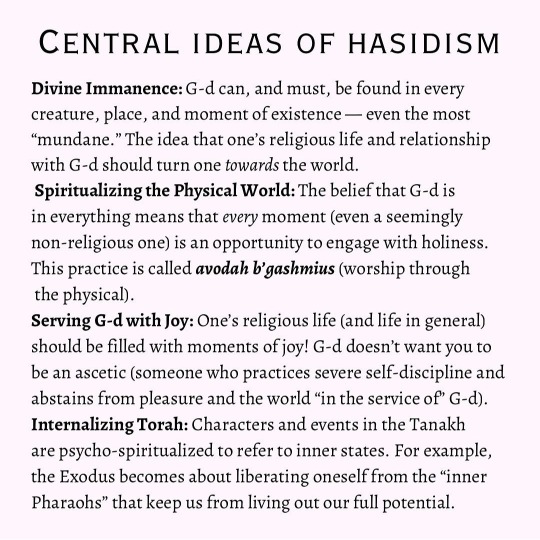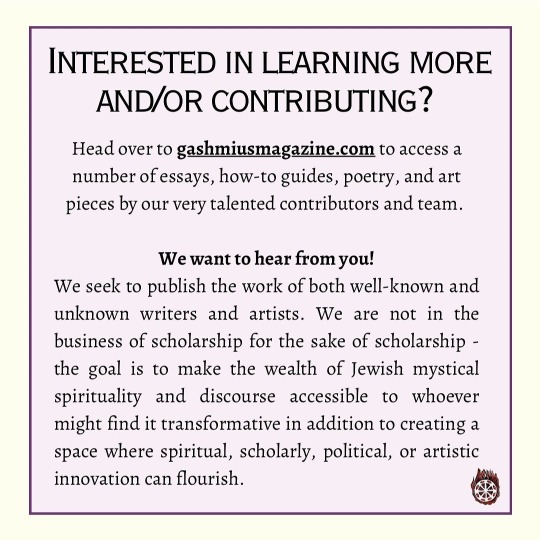#gashmius
Text







@gashmiusmagazine: "The goal of Gashmius Magazine is to make the world of neo-Hasidism accessible to anyone who might find it meaningful..."
186 notes
·
View notes
Text
Someone just came up to me and saw that my pupils were completely dilated (it happens generally every shabbos night) and they said to me "your gashmius is telling you that it's shabbos, why aren't you wearing your shabbos clothes?!"
I responded, "my gashmius is telling me that it's Purim!" and this is when I had still yet to break my fast.
#have you been smoking something?#bt life#i do not nor have ever done any drugs#while that seems to be a pretty common comment when people notice it#purim#I assure you it's only a physical response to an emotional/spiritual stimulus
7 notes
·
View notes
Text
Behar-Bechukotai
bs'd
Shalom, I hope you are well.
You have the opportunity to share in the mitzvah to honor a loved one by sponsoring my weekly parsha review, or for refua shelema (healing), or for shiduch, Atzlacha (success), etc. My weekly review goes out to over 5000 people in English and Spanish around the world. Contact me for more details.
Feel free to forward these words of Torah to any other fellow Jew. This essay is based on the teachings of R’ Yonatan Gefen.
Enjoy it and Shabbat Shalom.
Behar-Bechukotai
PREVENTION
The Torah tells us in this double parsha [1]:
"If your brother becomes impoverished and his means falter in your proximity, you shall strengthen him - the convert and the resident - so that he can live with you. " Don't let him go down and fall, and then it will be hard to stand him up, rather strengthen him from the time he stretches out his hand. To what is this similar - to a burden that is on a donkey; whilst it is on the donkey one man can support it and keep it up, but if it falls to the ground, even five men cannot raise it back up (Rashi)."
When a person begins a downward spiral towards poverty, the Torah instructs us to prevent his fall before he has nothing. As Rashi explains, it is far easier to help him whilst he still has something rather than to wait until he is penniless. It seems that we can derive from here an important life principle that is not restricted to giving charity. The Sefer, Zichron Meir writes that whilst preventative action is important in gashmius, it is essential in the realm of ruchnius. When a burden falls from a donkey, five men are required to put it back on, but when one falls spiritually, perhaps a hundred people cannot prevent the fall! He further points out that this principle applies to ones own spiritual standing. It is far easier to remove a negative aspect of behavior at its root than when it is well developed. He likens this to a sickness which is easy to cure if it is discovered early, but if it is left unattended, it may spread too far to remove it [2].
There seem to be two areas in which it is particularly crucial to work on at an early stage, in order to avoid insurmountable challenges later in life; Chinuch (parenting) and Shalom Bayit (peace in the home [3]). An easy way of addressing these areas is by studying the Torah approach towards them. A person may feel that he is able to deal with any possible challenges by using his common sense. There is a tremendous mistake in this attitude. Most people routinely spend many years studying in order to pursue a particular career. They recognize the need to be suitably qualified in their chosen field (even for more mundane issues such as cooking classes or learning computer skills we spend many hours of study). The irony is that the vast majority of people would agree that their marriage and family life are more important than their career. Nonetheless they expect to ably navigate the numerous challenges that they will face in these areas without investing time to learn more about them. Simply observing the world around us teaches us that having a successful marriage is no easy task - the divorce rate in the secular world is very high and sadly the figures seem to be rising in the Torah world. Similarly, the countless stories of children leaving Torah observance prove that being a good parent is no easy task.
A parent who decides how to bring up his (or her) child purely according to his own beliefs is at risk of making damaging mistakes that could easily be avoided by seeking Daat Torah [4] (Rav Chayim Volozhiner said that the education of a child begins twenty years before he is born. Before parents can educate their children, they must first educate themselves). Rav Dov Brezak Shilta, a well-known expert in chinuch offers a striking example of this sad phenomenon. He discusses a boy who had totally rejected his parents' lifestyle and was no longer religious. He writes that; "when told that his son does not even pray, this boy's father expressed his amazement. 'I put so much into my son's praying. How do you explain the fact that, in spite of all my efforts, I did not succeed?' The father then proceeded to describe how he had 'taught' his son to pray. 'I was always careful that he should come with me to minyan and sit next to me. During the prayers I didn't even allow myself the luxury of concentrating on my own prayers, for I kept my eye constantly on my son. I made sure that he was following the place in his siddur, and if he would start daydreaming I would immediately step in to make sure that he would get right back to praying.' This very question was presented to the boy himself. His bitter response was: 'There's nothing that I hate so much as praying. I've waited years for the day when I would be old enough to be able to stop praying. Just walking into the shul building gives me a bad feeling. I think it's because my father was so hard on me about praying that it became such an unbearable burden [5]." One of the striking facts about this sad story is how the father was so convinced that his approach was correct. He had absolutely no idea that it was this approach itself that drove his son away from prayer and Judaism. It is quite possible that had he, at an early stage, asked Daat Torah about how to educate his son in prayer, then he could have realized the potential damage that his chosen method could cause.
Similarly, basic mistakes in marriage can be avoided by attending shiurim, reading books, and speaking to one's Rebbe or Rebbetsin about their issues. It is essential to strive to identify and address difficulties in marriage at an early stage. Sadly, it is not uncommon for a couple to finally go for counseling when their problems are too deep-rooted to be fixed. This lesson also applies to people who have been married and have had children for many years. A person who is already married can nevertheless begin to increase the time and effort he invests into his marriage. Moreover, new challenges often emerge after many years of marriage that require renewed study in order to be dealt with properly. Similarly, a person who is not married or has no children can nevertheless begin preparing himself for marriage and chinuch before he enters these stages in life. As well as studying the appropriate areas he can work on his character traits many years before, making him more able to face future challenges.
We learn from the Parsha that helping someone before they have fallen is far easier than raising them back up after they have nothing. We saw that this principle applies in all areas of life; whether in marriage, chinuch, personal growth or any other area. By facing challenges at an early stage, one can avoid insurmountable difficulties later in life. ________________________________________________
[1] Behar, 25:35.
[2] Quoted in Lekach Tov, Parshat Behar, p.261-2.
[3] This term usually specifically refers to marriage as opposed to other relationships.
[4] Literally translated as 'the opinion of Torah' - this refers to views that derive from people whose sole source of wisdom is the Torah.
[5] Brezak, 'Chinuch in Turbulent Times', p.42.
Le Iluy nishmat Eliahu ben Simcha, Mordechai ben Shlomo, Perla bat Simcha, Abraham Meir ben Leah,Moshe ben Gila,Yaakov ben Gila, Sara bat Gila, Yitzchak ben Perla, Leah bat Chavah, Abraham Meir ben Leah.
Refua Shelema of Yaacov ben Miriam, Gila bat Tzipora, Tzipora bat Gila, Dvir ben Leah, Elimelech Dovid ben Chaya Baila, Noa bat Batsheva Devorah and Dovid Yehoshua ben Leba Malka.
0 notes
Photo

Let's talk about the power of today...the stark contrast between ruchnius and gashmius all tied into one...frivolity vs. fervor .... the ultimate struggle of life. Today is the day we can unlock doors by experiencing both...by using the joy and fun in this world to elevate ourselves spiritually. The power is immense! Have fun! Get spiritual! Stay safe!
0 notes